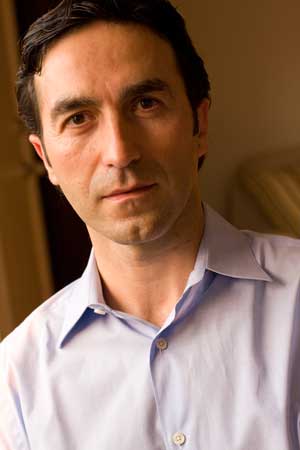|
PLUMS
My father wraps plums
with newspapers.
I cut the pages in half.
He wraps the plums.
We are in the attic.
It’s summer.
We don’t talk.
He rolls the fruits,
his fingers twist both ends of the paper.
It’s raining outside.
The plums look like wrapped candy.
He is meticulous, not too meticulous, just enough.
The plums have to be without nicks or cuts,
firm, not too ripe, unblemished.
The storms have been coming all afternoon.
That’s why my father is home;
he couldn’t go to the fields.
He ties the plums with a thin string,
like a necklace.
Five plums in each string, exactly five.
I don’t know why.
His hands inspect the fruit, twist the paper,
tie the knots, do the math.
I hide my hands under the newspapers.
He is on a ladder now.
He hangs the strings from a wooden beam in the
ceiling.
I pass the strings to him.
One by one.
Sometimes, unintentionally,
my hand brushes his hand.
He leans his body against the ladder,
rests for a moment,
cleans his sweat.
My father is old.
The strings dangle from the ceiling.
Plums in-waiting like dull,
modest Christmas ornaments.
Fruit for the winter, he says.
As if you could wrap the summer with newspapers.
As if you could wrap your father’s hands
for the future days of hunger.
published in TUPELO QUARTERLY, Inaugural Issue, 2014
KITCHEN ORACLE
We are both in your kitchen,
in your parent’s kitchen
in the house they have outside Madrid,
where you spent your summers as a child,
where you now spend your weekends.
We will spend our weekends here, you tell me.
You are cooking dinner,
it’s the end of May.
You are frying sardines in a big pan.
It’s very convenient this house,
it’s in the countryside
but not too far away from the city, you say.
You turn and show me the fish in the frying pan.
Fish with heads and tails and eyes.
I am setting the table.
Could you open the window? I say.
Every single window is open, you tell me.
Look, just the way you like your fish,
with the skin almost burnt, you say.
Sometimes kindness feels like a long,
thin, silver needle.
It’s fine. I say.
But we know it’s not fine.
Has not been fine for a while.
You turn off the stove.
I cannot stand the symmetry of the table;
two plates, two forks,
love and pity,
two glasses, two knives.
published in RIVER’S VOICE, Volume 15, Rio Hondo College, Whittier, CA, 2014
BALDOMERA
When Baldomera performs her own death
we children sing to her
Baldomera, Baldomera,
se te ve la faltriquera.
Baldomera, Baldomera,
we can see your underwear.
She opens the front doors of the house,
drags an old mattress on the floor,
puts it in the center
with two candles, one on each side.
She dresses in white,
wears a little wreath of paper flowers,
grabs a rosary,
lies on top of the mattress
and waits.
Her face is white.
She is not sick, my mother has told me,
that’s just rice powder.
We can see your underwear,
we can see your underwear,
we sing.
We sing until she gets up
and runs and chases us
through the streets.
Sometimes she loses her wreath,
the paper petals fly away.
We are young, she is old,
we run faster, we escape.
One day, one day I will catch you all, she says.
And I know it doesn’t matter
how fast I run, how young I am,
one day she will catch me,
like a dog that bites your ankle
and doesn’t let go.
NUN EATING A SMALL APPLE
We are in a bus,
my mother and I.
We are going to Zaragoza.
There is a nun sitting next to us.
She looks down,
hands crossed over a bag on her lap,
fat fingers.
In the middle of the trip
she takes out a small apple from the bag.
She offers the apple to me.
No words, just the gesture.
Thank you, my mother says.
I don’t take the apple.
With her right thumb
the nun makes the sign of the cross
over the apple’s skin.
She starts eating.
The apple is crunchy,
the first bite is loud
and the nun covers her mouth with both hands.
She has a piece of apple in her mouth.
She does not dare to chew it.
She cannot spit it out.
We look at each other.
She is probably embarrassed of her hunger.
She has shown the world that her body has needs.
The loud apple is her penitence.
After a while
she keeps eating
with small, silent, careful bites,
always covering her mouth with both hands.
She keeps eating
until there is almost nothing left,
just the thin, bare core of the apple.
No seeds remain.
Wasting food would have added another sin for confession.
When she is finished
she hides the core of the apple in her hand,
presses her lips with the back of her fist.
I notice the apple’s stem sticking out
like a rebellious appendix.
published in ZÓCALO PUBLIC SQUARE, Arizona State University, May 2014
|

|